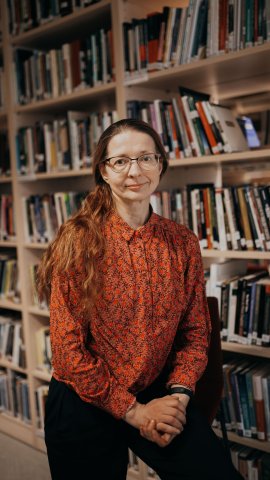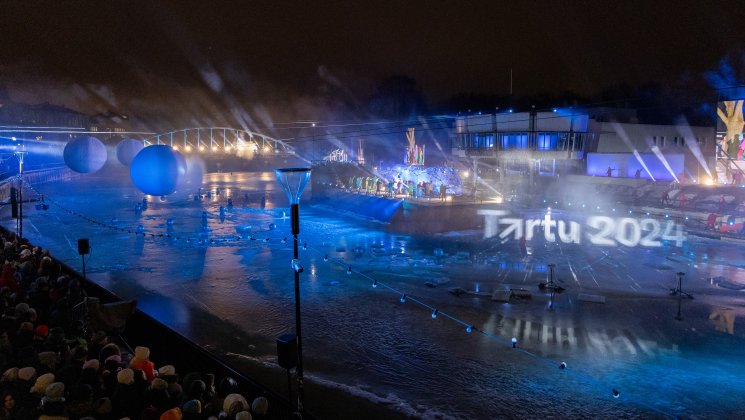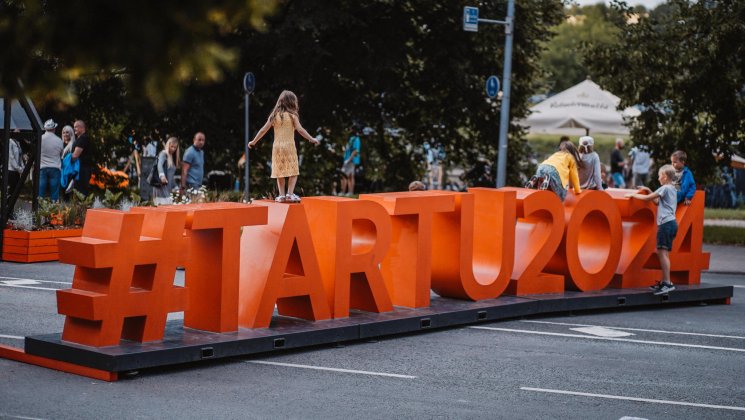-
Faculty of Arts and HumanitiesDean's Office, Faculty of Arts and HumanitiesJakobi 2 ruumid 116–121, 51005 Tartu linn, EST0Institute of History and ArchaeologyJakobi 2 51005 Tartu linn, Tartu linn, Tartumaa EST0Institute of Estonian and General LinguisticsJakobi 2, IV korrus 51005 Tartu linn, Tartu linn, Tartumaa EST0Institute of Philosophy and SemioticsJakobi 2, III korrus, ruumid 302-337 51005 Tartu linn, Tartu linn, Tartumaa EST0Institute of Cultural ResearchÜlikooli 16 51003 Tartu linn, Tartu linn, Tartumaa EST0Institute of Foreign Languages and CulturesLossi 3 51003 Tartu linn, Tartu linn, Tartumaa EST0School of Theology and Religious StudiesÜlikooli 18 50090 Tartu linn, Tartu linn, Tartumaa EST0Viljandi Culture AcademyPosti 1 71004 Viljandi linn, Viljandimaa EST0Professors emeriti, Faculty of Arts and Humanities0Associate Professors emeriti, Faculty of Arts and Humanities0Faculty of Social SciencesDean's Office, Faculty of Social SciencesLossi 36 51003 Tartu linn, Tartu linn, Tartumaa EST0Institute of EducationJakobi 5 51005 Tartu linn, Tartu linn, Tartumaa EST0Johan Skytte Institute of Political StudiesLossi 36, ruum 301 51003 Tartu linn, Tartu linn, Tartumaa EST0School of Economics and Business AdministrationNarva mnt 18 51009 Tartu linn, Tartu linn, Tartumaa EST0Institute of PsychologyNäituse 2 50409 Tartu linn, Tartu linn, Tartumaa EST0School of LawNäituse 20 - 324 50409 Tartu linn, Tartu linn, Tartumaa EST0Institute of Social StudiesLossi 36 51003 Tartu linn, Tartu linn, Tartumaa EST0Narva CollegeRaekoja plats 2 20307 Narva linn, Ida-Virumaa EST0Pärnu CollegeRingi 35 80012 Pärnu linn, Pärnu linn, Pärnumaa EST0Professors emeriti, Faculty of Social Sciences0Associate Professors emeriti, Faculty of Social Sciences0Faculty of MedicineDean's Office, Faculty of MedicineRavila 19 50411 Tartu linn, Tartu linn, Tartumaa ESTInstitute of Biomedicine and Translational MedicineBiomeedikum, Ravila 19 50411 Tartu linn, Tartu linn, Tartumaa ESTInstitute of PharmacyNooruse 1 50411 Tartu linn, Tartu linn, Tartumaa ESTInstitute of DentistryL. Puusepa 1a 50406 Tartu linn, Tartu linn, Tartumaa ESTInstitute of Clinical MedicineL. Puusepa 8 50406 Tartu linn, Tartu linn, Tartumaa ESTInstitute of Family Medicine and Public HealthRavila 19 50411 Tartu linn, Tartu linn, Tartumaa ESTInstitute of Sport Sciences and PhysiotherapyUjula 4 51008 Tartu linn, Tartu linn, Tartumaa ESTProfessors emeriti, Faculty of Medicine0Associate Professors emeriti, Faculty of Medicine0Faculty of Science and TechnologyDean's Office, Faculty of Science and TechnologyVanemuise 46 - 208 51003 Tartu linn, Tartu linn, Tartumaa ESTInstitute of Computer ScienceNarva mnt 18 51009 Tartu linn, Tartu linn, Tartumaa ESTInstitute of GenomicsRiia 23b/2 51010 Tartu linn, Tartu linn, Tartumaa ESTEstonian Marine Institute0Institute of PhysicsInstitute of ChemistryRavila 14a 50411 Tartu linn, Tartu linn, Tartumaa EST0Institute of Mathematics and StatisticsNarva mnt 18 51009 Tartu linn, Tartu linn, Tartumaa EST0Institute of Molecular and Cell BiologyRiia 23, 23b - 134 51010 Tartu linn, Tartu linn, Tartumaa ESTTartu ObservatoryObservatooriumi 1 61602 Tõravere alevik, Nõo vald, Tartumaa EST0Institute of TechnologyNooruse 1 50411 Tartu linn, Tartu linn, Tartumaa ESTInstitute of Ecology and Earth SciencesJ. Liivi tn 2 50409 Tartu linn, Tartu linn, Tartumaa ESTProfessors emeriti, Faculty of Science and Technology0Associate Professors emeriti, Faculty of Science and Technology0Institute of BioengineeringArea of Academic SecretaryHuman Resources OfficeUppsala 6, Lossi 36 51003 Tartu linn, Tartu linn, Tartumaa EST0Area of Head of FinanceFinance Office0Area of Director of AdministrationInformation Technology Office0Administrative OfficeÜlikooli 17 (III korrus) 51005 Tartu linn, Tartu linn, Tartumaa EST0Estates Office0Marketing and Communication OfficeÜlikooli 18, ruumid 102, 104, 209, 210 50090 Tartu linn, Tartu linn, Tartumaa EST0Area of Vice Rector for DevelopmentCentre for Entrepreneurship and InnovationNarva mnt 18 51009 Tartu linn, Tartu linn, Tartumaa EST0University of Tartu Natural History Museum and Botanical GardenVanemuise 46 51003 Tartu linn, Tartu linn, Tartumaa EST0International Cooperation and Protocol Office0University of Tartu MuseumLossi 25 51003 Tartu linn, Tartu linn, Tartumaa EST0Area of RectorRector's Strategy OfficeInternal Audit OfficeArea of Vice Rector for Academic AffairsOffice of Academic AffairsUniversity of Tartu Youth AcademyUppsala 10 51003 Tartu linn, Tartu linn, Tartumaa EST0Student Union OfficeÜlikooli 18b 51005 Tartu linn, Tartu linn, Tartumaa EST0Centre for Learning and TeachingArea of Vice Rector for ResearchUniversity of Tartu LibraryW. Struve 1 50091 Tartu linn, Tartu linn, Tartumaa EST0Grant Office

The European Capital of Culture Raises the Topic of Trust and Survival

On October 3, 2024, the Centre for Ethics of the University of Tartu held the conference “Trust = Survival?! - Where Does Trust Come From, Where Does It Go, and How to Survive?” Experts gathered to explore the multifaceted concept of trust, examining it from the perspectives of survival in crisis, community and collaboration, and the role of science in building public confidence.
This conference marked the culmination of the Tartu World University project, led by the Centre for Ethics of the University of Tartu as part of the European Capital of Culture Tartu 2024 programme. Since its inception in 2022, the programme has hosted 45 events, reaching 16,000 participants both online and in person.
In the first half of the conference, scientists discussed public trust in science. Agata Gurzawska, a researcher and scientific coordinator for the VERITY project, highlighted steps scientists can take to build public confidence. Philosopher and politician Margit Sutrop, along with sociologist and communication researcher Külliki Seppel, reflected on what builds trust in science and the factors that influence it. Associate Professor of Sociology of Sustainability Kati Orru and early-career researcher in crisis sociology Kristi Nero shared research on the sources of trust for vulnerable social groups during crises.
The conference replay is available on the UTTV website (in Estonian)
The conference then focused on the relationship between trust and community, featuring survival stories where trust had either waned or been restored. Lecturer in Social Well-being Merle Linno and Tartu World University project manager Triinu Laan shared insights on trust in South Estonian communities, drawing on interviews from the Tartu World University impact study. Lilian Freiberg, a member of the Karula National Park community, recounted her experience nearly a year ago when the region endured weeks without electricity. She addressed questions of trust: who it strengthened, who it diminished, and what might have been done differently.
A panel discussion with communications expert and political commentator Põim Kama centred on trust’s role in social, political, and economic relationships. Kama, one of the authors of the widely discussed open letter “The Paralympics of Southeast Estonia, or 12 Dinners,” observed that trust often becomes a focus only once it’s lost, and noted that dignity, once broken, often lies behind this loss.
Author Valdur Mikita reflected on physical labour as a bonding force within communities since time immemorial—a form of social interaction, a survival strategy, and an essential part of identity-building. He referenced past generations, who, despite life’s hardships, found ways to live without bitterness, "hands in pockets, pressing potatoes." Annela Laaneots, coordinator for the Tartu 2024 South Estonia programme, drew a parallel, sharing examples from the cultural capital project as a journey of building trust.
The day’s atmosphere was enriched by a performance of “City of Good Thoughts” by the Tartu Waldorf Theatre, directed by Külli Aavakivi. Each Tartu resident has their own story of the city, brought to life by Tartu Waldorf School students in grades 8–10. Robin Liiber, a University of Tartu political science student and social field student representative and a proud Tarvastu native, moderated the event.
Visual simplifier Kati Orav helped capture connections and insights throughout the day, illustrating collective learning, vivid emotions, and fresh ideas. She collected participants’ reflections and synthesised them into a summarising poster by day’s end.
The conference concluded with a screening of “Official Secrets” and a discussion on whistleblowing, freedom of speech, and journalistic responsibility. Halliki Harro-Loit and British journalist Martin Bright, who uncovered the story that inspired the film, shared their perspectives on these themes.
Photos of the conference by Sirli Lanemann
The Tartu World University project, part of the Tartu 2024 main programme, has hosted a series of community academy events across South Estonia, where active community members have connected with leading global researchers to exchange ideas and seek solutions to both global and local challenges. The Tartu 2024 project “South Estonia Community Programme” was a key partner in these activities.
Read more similar news





